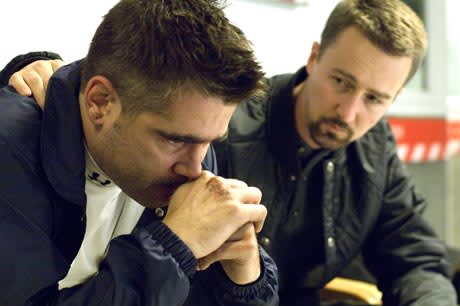In the great Venn diagram of cinematic taxonomy, there's an awful lot of well-populated acreage where morally compromised NYC cop epics (Prince of the City, Serpico) overlap with sloppily operatic Irish Catholic family dysfunction (On the Waterfront, pretty much anything from Eugene O'Neill). And that's where, nestled up uncomfortably close to 2007's We Own the Night, we find Gavin O'Connor's Pride and Glory, an immensely self-serious disquisition on, well, an operatically dysfunctional family of morally compromised Irish Catholic NYC cops. Edward Norton and Colin Farrell head up said multigenerational cohort of Tierneys and Egans, marooned in an appropriately grey and snowy Washington Heights, way up north of Harlem, where street dealers and the occasional crooked cop go, as often as not, to die. The plot details don't seem to matter much to the filmmakers, nor to us: drugs, graft, executions and (disappointingly to fans of Wire-style moral relativism) rabidly subhuman Latino thugs are all accounted for in the customary proportions. But these are all just pegs on which O'Connor seeks to hang an inquiry into the three great tribes — church, police force, family — and how blind loyalties to each act as nooses, cutting off the oxygen to those parts of the brain that might rationally, if not morally, handle their conflicting demands. This is all intelligently (though not, at 130 minutes, economically) handled but nothing terribly original is added to the genre wiki that the Lumets and Scorseses of the world haven't been fleshing out for the last half-century or so. Farrell (impulsive, violent) and Norton (smart, sensitive, damaged) are cast to type and their performances, fine as they are, offer few surprises. At the end of the day, Pride belongs to Noah Emmerich, Farrell and Norton's brother and captain, who is wonderfully, soulfully wounded as the guy who wants, but doesn't quite have the spine, to make things right. And to Jon Voigt, unusually moving and un-shtick-y as the teary, beery patriarch of both family and force who can see but not stop the collective descent. As convention requires, the women — decorative Lake Bell, wistful Carmen Ejogo, doomed Jennifer Ehle — are window dressing, required only to support, procreate and rend the occasional garment. The movie is saved from irredeemable, if well meaning, triteness by a strikingly violent denouement whereby a standard police convenience store shakedown erupts with frightening velocity into a full-on race riot that sucks in all the principals and delivers them to their various comeuppances. The only extra is a detailed, soup-to-nuts making-of. Not much is added to our understanding of the movie but in recompense we get some discussion of Norton's "process," an uncomfortable look into how seriously O'Connor takes himself when sleep-deprived and above all, a poignant snapshot of a time when all concerned really believed themselves involved in something timeless or, better yet, Oscar-worthy.
(Alliance)Pride and Glory
Directed by Gavin O'Connor

BY Paul DuderPublished Feb 20, 2009



